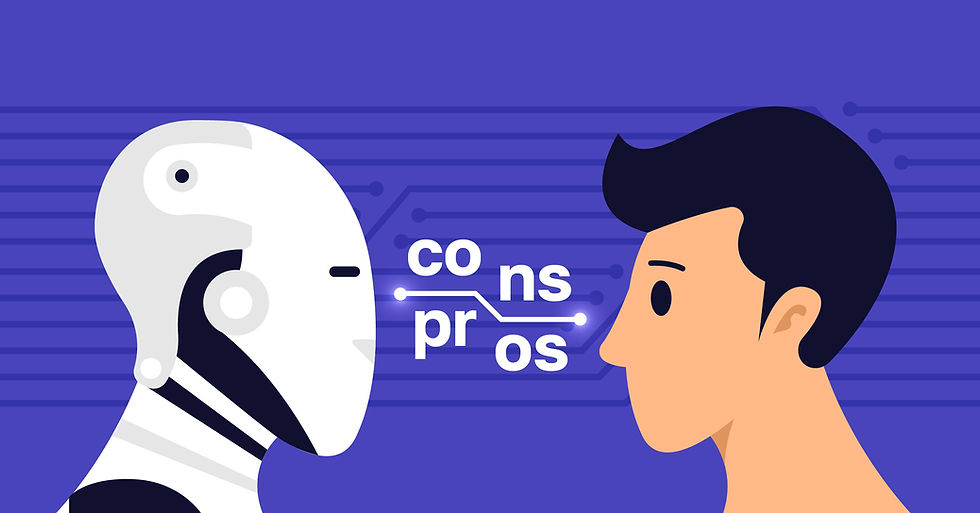AI vs. Human Moderators: The Future of Focus Group Interviews
- QT Press
- Jul 30, 2025
- 4 min read
Updated: 6 days ago
Focus groups remain a vital tool in market research, providing businesses with rich insights into consumer preferences, behaviors, and motivations. The moderator, whether human or AI, plays a pivotal role in guiding discussions, probing for deeper responses, and ensuring productive exchanges. For years, human moderators have been the go-to, using their knack for reading the room and connecting with people. But now, artificial intelligence (AI) is stepping into the spotlight, promising to shake things up. So, who’s better at running the show? AI or humans? As technology reshapes the landscape, the question that looms over our heads is, will AI moderators redefine the future of focus group interviews, or do human moderators retain their edge?

Why Moderators Are the Heart of Focus Groups
Focus groups typically involve 6-12 participants discussing a product, service, or concept under the guidance of a moderator. The moderator’s job? Keep the conversation flowing, ask the right questions, and make sure everyone feels heard. Their ability to interpret tone, read body language, and adapt in real-time is crucial for uncovering authentic insights.
Human moderators are naturals at this. They can sense when someone’s holding back, pick up on a raised eyebrow, or steer the group back when things go off-topic. But they’re not perfect, humans get tired, and running focus groups, especially across languages or countries, can be pricey. That’s where AI moderators come in and offer a scalable alternative. They're powered by smart tech like natural language processing (NLP) and real-time analytics.
AI Moderators: The Tech-Savvy Newcomers
AI moderators are software-driven systems designed to lead focus group discussions, analyze responses, and generate insights. These software systems use advanced tech to lead discussions, analyze responses, and even transcribe conversations on the spot. Businesses are increasingly adopting AI moderators for their efficiency and ability to handle large-scale or remote focus groups.
Strengths of AI Moderators
Scalability and Efficiency: AI can juggle multiple focus simultaneously across time zones and languages, whether they’re in London, Paris, or Berlin. No coffee breaks needed.
No Bias, No Burnout: AI eliminates human fatigue and bias, following scripted protocols consistently to ensure standardized questions and unbiased results.
Instant Insights: AI doesn’t just listen; it analyzes. It can spot trends, gauge emotions, and highlight key points as the group talks.
Cost-Effectiveness: Hiring human moderators for global focus groups can break the bank, especially with travel or translation costs.
Multilingual Capabilities: AI moderators, supported by advanced translation tools, handle focus groups in multiple languages seamlessly.
Limitations of AI Moderators
Lack of Emotional Intelligence: AI struggles to replicate human empathy or interpret subtle emotional cues, such as a participant’s hesitation, which human moderators handle adeptly.
Cultural Sensitivity: AI may misinterpret cultural contexts or colloquialisms, potentially leading to misunderstandings.
Limited Adaptability: AI follows pre-programmed scripts and may falter with unexpected group dynamics, such as off-topic discussions, where humans excel.
Data Privacy Concerns: AI’s cloud-based processing raises security concerns for sensitive topics.

Human Moderators: The Heart and Soul of Focus Groups
Human moderators are like the trusted friend who knows exactly how to get everyone talking. They bring warmth, intuition, and a knack for uncovering insights that tech can’t touch. Here’s why they’re still in high demand:
Strengths of Human Moderators
Empathy and Rapport: Humans create a comfortable environment, encouraging open sharing, whether it’s a smile or a well-timed question. This is huge for sensitive topics like healthcare or personal experiences.
Cultural and Contextual Understanding: Humans get the little things, like why a nod means something different in one culture versus another. They can tweak their approach to fit the group.
Dynamic Facilitation: If someone dominates the conversation or the group veers off-topic, a human moderator can smoothly get things back on track. Their gut instinct helps them dig into unexpected insights.
Deep Insights: Human moderators uncover more nuanced insights than AI, thanks to their ability to interpret non-verbal cues like body language
Limitations of Human Moderators
Pricey and Time-Intensive: Human moderators are costly, particularly for multinational projects.
Subjectivity: Even skilled moderators may introduce bias through tone or phrasing, potentially skewing results.
Time Constraints: Humans can only moderate one group at a time, which slows things down compared to AI’s multitasking capabilities.
The Future: Teamwork Makes the Dream Work
The future of focus groups isn’t AI or humans, it’s AI and humans. AI’s great for crunching data, handling multiple languages, and keeping costs low, while humans bring the heart and soul that make insights meaningful.
What’s Holding Us Back (and What’s Next)?
There are a few hurdles to clear. Data privacy is a big one. Nobody wants their focus group chats floating around the cloud. Plus, AI needs to get better at understanding cultural quirks and handling tricky group dynamics.
Conclusion: The Smartest Moderation Isn’t Either–Or, It’s Both
AI is transforming focus group research with speed, scalability, and around-the-clock capabilities. It can handle hundreds of interviews at once, support multiple languages, and deliver structured insights in real time, making it a powerful tool for large-scale, time-sensitive, or budget-conscious projects.
But when your research goals require emotional depth, cultural sensitivity, or trust-building, AI simply can’t replicate the intuition and empathy of a skilled human moderator. Humans read between the lines, respond in the moment, and adapt to subtle cues that software can’t detect. This is also true for some research involving sensitive subjects or personal information, compliance with GDPR, HIPAA, other international data privacy laws.
That’s why the most effective approach is contextual. Use AI where consistency and efficiency matter most, and lean on human moderators where interpretation, flexibility, and emotional intelligence are critical. The future of qualitative research lies in knowing when and how to combine these strengths.



